Bone marrow transplant (BMT) is a highly specialized medical approach that plays a critical role in the treatment of severe blood-related diseases and immune disorders. Conditions such as leukemia, lymphoma, multiple myeloma, and inherited blood disorders like thalassemia & sickle cell anemia often require a bone marrow transplant as a last resort for survival and recovery. While this procedure is complex and resource-intensive, Bone Marrow Transplant Cost in India is significantly lower compared to many developed countries, making India a preferred destination for affordable, high-quality medical care. You can raise fund for Bone marrow transplant via platforms like ImpactGuru.
The bone marrow, a vital tissue located within our bones, is responsible for producing essential blood components, comprising red blood cells, white blood cells, & platelets. When the marrow becomes diseased or damaged due to conditions like cancer or genetic disorders, the body’s ability to maintain a healthy blood cell balance is compromised. This can lead to life-threatening intricacies such as severe anemia, infections, and uncontrolled bleeding. A bone marrow transplant restores this balance by introducing healthy stem cells into the patient’s bloodstream, which then regenerate functional bone marrow.
India has earned global recognition for its advanced healthcare infrastructure, expert medical professionals, and cost-effective treatments. The country offers bone marrow transplants at a fraction of the cost compared to Western nations like the United States or the United Kingdom. For instance, while the same procedure can cost upwards of INR 50 lakhs in the United States, Bone Marrow Transplant Cost in India ranges between INR 10-25 lakhs, depending on the type of transplant and hospital. Despite the affordability, Indian hospitals maintain stringent quality standards and adhere to international protocols, ensuring optimal outcomes for patients.
This blog will guide you through everything you need to know about bone marrow transplant costs in India. From the different types of transplants and their price variations to pre-operative expenses and the best hospitals for the procedure, we’ll provide you with a comprehensive overview. For additional details about healthcare expenses across India, you can refer to our Complete Guide to Treatment & Surgery Costs in India.
Table of Contents
- Bone Marrow Transplant Cost in India
- Why Choose India for Bone Marrow Transplants?
- Types Of Bone Marrow Transplant (BMT) And Their Cost In India
- Pre-operative Tests Costs For Bone Marrow Transplant In India
- Factors Affecting The Cost Of Bone Marrow Transplants In India
- List Of 10 Best Bone Marrow Transplant Hospitals In India
- 1) Tata Memorial Hospital, Mumbai
- 2) Indraprastha Apollo Hospitals, Delhi
- 3) Medanta – The Medicity, Gurgaon
- 4) Artemis Hospitals, Gurgaon
- 5) Fortis Memorial Research Institute, Gurgaon
- 6) Apollo Hospital, Chennai
- 7) BLK Super Speciality Hospital, Delhi
- 8) Manipal Hospital, Bangalore
- 9) Kokilaben Dhirubhai Ambani Hospital, Mumbai
- 10) Narayana Health City, Bangalore
- Conclusion
- FAQs About Bone Marrow Transplant Costs in India
Bone Marrow Transplant Cost in India
The Bone Marrow Transplant (BMT) Cost in India varies between ₹12,50,000 – ₹55,00,000, making it a highly cost-effective option compared to countries like the United States, where the procedure can cost up to INR 1 crore or more. India’s competitive pricing, combined with world-class healthcare facilities, has made it a foremost destination for medical tourism, especially for life-saving treatments like bone marrow transplants.
Detailed Breakdown of Costs
- Autologous Bone Marrow Transplant:
- Cost: INR 10 lakhs to INR 15 lakhs.
- Description: This type of transplant involves harvesting the patient’s own healthy stem cells and reintroducing them after intensive therapy. It is primarily used for conditions like multiple myeloma and non-Hodgkin lymphoma.
- Key Considerations: Relatively lower risk of complications since the patient’s own cells are used, which eliminates donor-related issues.
- Allogeneic Bone Marrow Transplant:
- Cost: INR 15 lakhs to INR 25 lakhs.
- Description: This procedure uses stem cells from a donor (either related or unrelated) and is ideal for treating genetic blood disorders like thalassemia, sickle cell anemia, and leukemia.
- Key Considerations: Higher costs due to the need for human leukocyte antigen (HLA) matching, which ensures compatibility between the donor and the recipient. Unrelated donor transplants may involve international registries, adding to the expense.
- Haploidentical Bone Marrow Transplant:
- Cost: INR 20 lakhs to INR 25 lakhs.
- Description: In this type of transplant, the donor is a partial match, often a family member. Advanced techniques like T-cell depletion are employed to reduce the risk of graft-versus-host disease (GVHD).
- Key Considerations: This procedure is often a solution for patients who cannot find a fully matched donor and requires highly skilled medical teams.
How India Compares Globally
India offers exceptional cost advantages while maintaining high standards of care:
- United States: INR 50 lakhs to INR 1 crore.
- United Kingdom: INR 40 lakhs to INR 80 lakhs.
- Singapore: INR 35 lakhs to INR 60 lakhs.
- India: INR 10 lakhs to INR 25 lakhs.
Despite the affordability, Indian hospitals employ internationally trained doctors and cutting-edge technology and follow stringent safety protocols.
Hidden Costs to Consider
While India is cost-effective, patients should plan for additional expenses:
- Travel and Accommodation: International patients often incur travel expenses of INR 1 lakh to INR 3 lakhs, depending on the country of origin.
- Complication Management: In rare cases of complications such as infections or GVHD, costs can increase by INR 2 lakhs to INR 5 lakhs.
- Follow-up Visits: Long-term follow-up care is essential, with each consultation costing INR 5,000 to INR 15,000.
Why Choose India for Bone Marrow Transplants?
- Skilled Specialists: Indian doctors specializing in hematology and stem cell transplantation are globally recognized for their expertise.
- Global Accreditations: Leading hospitals in India are JCI and NABH accredited, ensuring adherence to global standards.
- Holistic Care: Many hospitals provide packages that include counseling, accommodation, visa assistance, and rehabilitation support for international patients.
- Success Rates: The success rate for bone marrow transplants in India is comparable to developed countries, varying from 60% to 90%, depending on the patient’s condition and the type of transplant.
Types Of Bone Marrow Transplant (BMT) And Their Cost In India
Bone marrow transplants (BMT) are classified into three primary types based on the source of stem cells used for the procedure. Each type serves specific medical conditions and comes with distinct cost implications. Understanding these differences can help patients & their families make informed decisions about treatment.
1. Autologous Bone Marrow Transplant
- Description:
In an autologous transplant, the patient’s healthy stem cells are harvested, stored, and reinfused after intensive chemotherapy or radiation therapy. This method is often referred to as a “self-transplant.” - Medical Conditions Treated:
Multiple myeloma, Hodgkin’s lymphoma, and non-Hodgkin’s lymphoma. - Cost in India:
- Ranges between INR 10 lakhs and INR 15 lakhs.
- Costs are lower because there is no need for a donor match or related testing.
- Advantages:
- Eliminates the risk of immune rejection since the patient’s stem cells are used.
- Fewer complications compared to other transplant types.
2. Allogeneic Bone Marrow Transplant
- Description:
This procedure involves using stem cells from a donor, who could be a sibling, unrelated volunteer, or cord blood donor. Compatibility between the donor & recipient is determined through Human Leukocyte Antigen (HLA) typing. - Medical Conditions Treated:
Leukemia, aplastic anemia, and genetic blood disorders like thalassemia & sickle cell anemia. - Cost in India:
- Ranges from INR 15 lakhs to INR 25 lakhs.
- The higher cost is attributed to donor-related procedures, such as HLA typing and procurement from donor registries.
- Key Considerations:
- Unrelated donor transplants may involve international donor registries, adding INR 5 lakhs to INR 10 lakhs.
- The risk of graft-versus-host disease (GVHD) requires long-term monitoring and additional medications.
3. Haploidentical Bone Marrow Transplant
- Description:
A haploidentical transplant uses stem cells from a partially matched donor, often a family member like a parent or sibling. This method is beneficial for patients who cannot find a fully matched donor. - Medical Conditions Treated:
Leukemia, myelodysplastic syndrome, and bone marrow failure syndromes. - Cost in India:
- Typically ranges between INR 20 lakhs and INR 25 lakhs.
- The cost reflects the complexity of the procedure and the advanced techniques required to manage risks.
- Advantages:
- A broader donor pool reduces the time needed to find a suitable donor.
- Advanced methods like T-cell depletion minimize complications like GVHD.
Comparative Cost Table for Different BMT Types in India
| Type of Transplant | Cost Range (INR) | Key Features |
| Autologous | 10 lakhs – 15 lakhs | Uses patient’s stem cells, which has fewer risks. |
| Allogeneic | 15 lakhs – 25 lakhs | Requires donor match, higher risks. |
| Haploidentical | 20 lakhs – 25 lakhs | Partially matched donor, advanced techniques. |
How to Determine the Right Type of Transplant
- Disease Type:
- Autologous transplants are typically used for cancers like multiple myeloma and lymphoma.
- Allogeneic and haploidentical transplants are preferred for genetic disorders and aggressive blood cancers like leukemia.
- Donor Availability:
- Patients with fully matched donors are ideal candidates for allogeneic transplants.
- In cases where a donor isn’t readily available, haploidentical transplants offer a viable alternative.
- Medical Team’s Assessment:
- A detailed evaluation by a hematologist or oncologist will determine the most suitable transplant based on the patient’s condition and compatibility with a donor.
India’s medical expertise ensures that patients receive personalized care tailored to their specific needs. The cost-effectiveness and high success rates of these transplants make the country a preferred destination for patients worldwide.
Pre-operative Tests Costs For Bone Marrow Transplant In India
Before undergoing a Bone Marrow Transplant (BMT), patients and, in the case of allogeneic transplants, donors must undergo several pre-operative tests. These tests are crucial to evaluate the patient’s overall health, determine compatibility between the donor and recipient, and ensure the procedure’s success. Below is a detailed breakdown of the common pre-operative tests and their associated costs in India.
1. Complete Blood Count (CBC)
- Purpose: Assesses overall health by measuring red and white blood cells, hemoglobin levels, and platelets.
- Cost: ₹500 – ₹1,000.
2. HLA Typing (Human Leukocyte Antigen Typing)
- Purpose: Identifies a compatible donor by matching specific genetic markers. Essential for allogeneic transplants.
- Types of HLA Typing:
- Low-Resolution Typing: Used for preliminary matching.
- High-Resolution Typing: Provides detailed information for better donor-recipient compatibility.
- Cost:
- Low-resolution typing: ₹10,000 – ₹15,000 per person.
- High-resolution typing: ₹25,000 – ₹40,000 per person.
- Family HLA typing (for multiple family members): ₹50,000 – ₹1,00,000.
3. Bone Marrow Biopsy
- Purpose: Check the condition of the bone marrow, detect abnormalities, and confirm the diagnosis of blood-related disorders.
- Cost: ₹5,000 – ₹15,000.
4. Infectious Disease Screening
- Purpose: Ensures that the patient or donor is free from infectious diseases like HIV, Hepatitis B, Hepatitis C, and CMV (Cytomegalovirus), which can affect transplant outcomes.
- Tests and Costs:
- HIV: ₹300 – ₹1,000.
- Hepatitis B and C: ₹500 – ₹2,000 per test.
- CMV Testing: ₹2,000 – ₹4,000.
5. Organ Function Tests
- Purpose: Evaluate the functioning of critical organs like the heart, liver, and kidneys to determine transplant readiness.
- Tests and Costs:
- Liver Function Test (LFT): ₹500 – ₹1,500.
- Kidney Function Test (KFT): ₹500 – ₹1,500.
- Cardiac Evaluation (ECG and Echocardiogram): ₹2,000 – ₹5,000.
6. Pulmonary Function Test (PFT)
- Purpose: Assesses lung function and ensures that the respiratory system can handle the stress of the transplant.
- Cost: ₹1,000 – ₹3,000.
7. Imaging Tests
- Purpose: Provides detailed images of internal organs to detect abnormalities or infections.
- Common Imaging Tests and Costs:
- Chest X-ray: ₹500 – ₹1,000.
- CT Scan (Chest/Abdomen): ₹5,000 – ₹12,000.
- PET-CT Scan (for cancer patients): ₹18,000 – ₹25,000.
8. Blood Chemistry Panel
- Purpose: Checks electrolytes, blood sugar, and other chemical levels in the blood.
- Cost: ₹1,000 – ₹2,000.
9. Coagulation Profile
- Purpose: Assesses blood clotting ability to prevent excessive bleeding during the procedure.
- Cost: ₹1,000 – ₹2,500.
10. Psychological Evaluation
- Purpose: Assess the patient’s mental readiness and emotional stability for the transplant process.
- Cost: ₹1,500 – ₹5,000.
Total Estimated Cost for Pre-operative Tests
- Autologous Transplant Pre-operative Costs: ₹30,000 – ₹70,000.
- Allogeneic Transplant Pre-operative Costs: ₹70,000 – ₹1,50,000 (includes donor testing and HLA typing).
Importance of Pre-operative Tests
- Ensures the patient is medically and physically fit for the transplant.
- Identifies potential risks or complications that can be mitigated before the procedure.
- Improves the chances of transplant success by matching donors effectively.
Factors Affecting The Cost Of Bone Marrow Transplants In India
The Bone Marrow Transplant cost in India depends on several critical factors, which can significantly impact the overall expense. Here’s a detailed breakdown:
1. Type of Transplant
- Autologous Transplant:
- In this procedure, the patient’s stem cells are used.
- Typically less expensive as there are no donor-related costs.
- Suitable for conditions like lymphoma or multiple myeloma.
- Allogeneic Transplant:
- Uses stem cells from a donor (related, unrelated, or matched donor).
- Higher costs due to donor matching, HLA typing, and procurement processes.
- Recommended for conditions like leukemia, severe aplastic anemia, or genetic disorders.
2. Hospital Infrastructure and Location
- Tier-1 Cities (Delhi, Mumbai, Bangalore):
- Advanced infrastructure, world-class facilities, and experienced specialists.
- Costs are higher compared to smaller cities.
- Tier-2 Cities (Pune, Kolkata, Hyderabad):
- Affordable options with good-quality care but fewer facilities compared to metro cities.
3. Patient’s Medical Condition
- Pre-existing conditions like diabetes, infections, or organ dysfunction can complicate the procedure.
- It may require extended pre-transplant preparation, increasing costs.
4. Donor Matching Process
- The cost of HLA typing and finding a matched donor can be substantial.
- If a matched unrelated donor is needed, costs can escalate further.
5. Hospital Stay and Post-Transplant Care
- Patients may require prolonged hospital stays for monitoring and recovery.
- Post-transplant medications like immunosuppressants and antibiotics can add to the total cost.
- Regular follow-ups and management of complications (e.g., Graft-Versus-Host Disease) are critical and expensive.
6. Insurance and Financial Assistance
- The availability & extent of insurance coverage for BMT can impact out-of-pocket expenses.
- Government schemes or NGO-funded programs may provide financial assistance for eligible patients.
List Of 10 Best Bone Marrow Transplant Hospitals In India
1) Tata Memorial Hospital, Mumbai
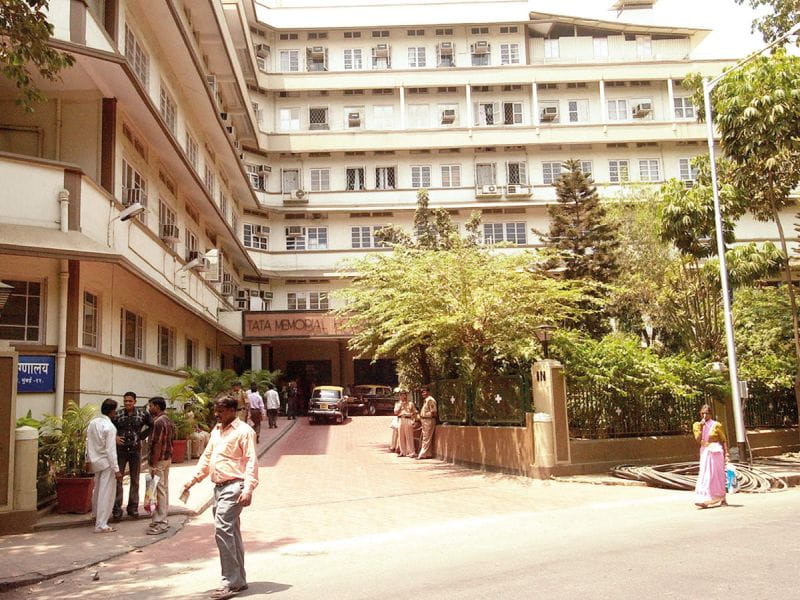
- Location: Mumbai, Maharashtra
- Established: 1941
- Accreditations: Recognized by national and international organizations such as WHO, IAEA, and UICC
Achievements and Milestones in Bone Marrow Transplant:
- Pioneering Techniques: Performed India’s first successful allogeneic bone marrow transplant in 1983 citeturn0search4
- Recent Developments: Performed the first CAR-T cell therapy (a kind of gene therapy) at the Bone Marrow Transplant division at ACTREC, Tata Memorial Center citeturn0search16
Medical Team:
- Surgeons: Dr. Suresh Advani, a pioneer in bone marrow transplants in India citeturn0search12
- Multidisciplinary Team: Comprises experienced oncologists, hematologists, and specialized nursing staff
- Experience: Decades of experience in oncology and bone marrow transplantation
Facilities and Technology:
- Bone Marrow Transplant Unit: Equipped with HEPA-filtered rooms, laminar flow systems, and advanced infection control measures citeturn0search8
- Advanced Technology: Utilizes cutting-edge equipment for diagnostics and treatment, including PET-CT scanners
- Imaging and Diagnostic Facilities: Comprehensive imaging services with state-of-the-art technology
Comprehensive Care:
- Pre-Transplant Evaluation: Thorough assessment protocols for both donors and recipients
- Post-Transplant Care: Dedicated follow-up clinics, rehabilitation services, and patient counseling
- Support Services: Offers psychological support, dietary counseling, and patient education programs
2) Indraprastha Apollo Hospitals, Delhi
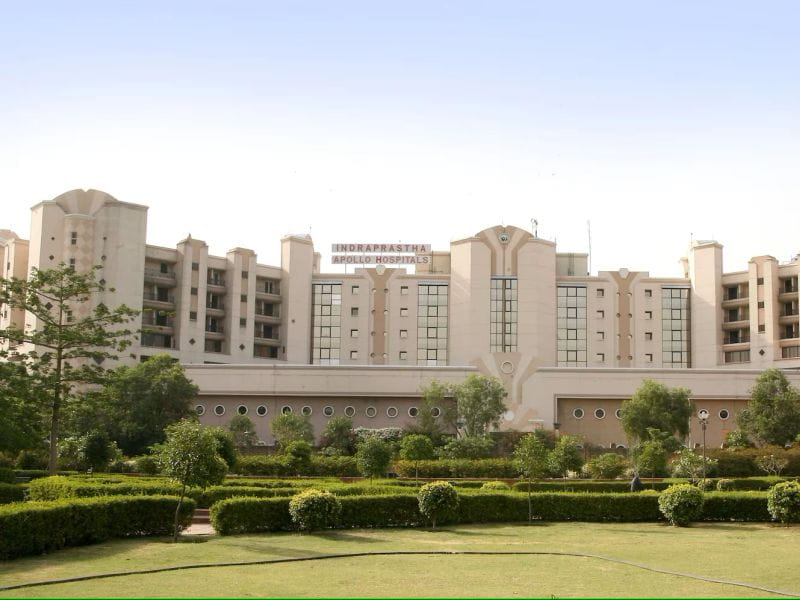
- Location: New Delhi, Delhi
- Established: 1996
- Accreditations: First hospital in India to be accredited by Joint Commission International (JCI) citeturn0search17
Achievements and Milestones in Bone Marrow Transplant:
- Firsts: Performed its first bone marrow transplantation in 1995 citeturn0search1
- Notable Cases: Successfully treated a baby with a rare mutation in the NF-E2 gene through a bone marrow transplant in 2020 citeturn0search9
Medical Team:
- Surgeons: Led by experienced hematologists and transplant surgeons
- Multidisciplinary Team: Includes specialists in hematology, oncology, immunology, and supportive care
- Experience: Extensive experience with a high volume of transplant procedures
Facilities and Technology:
- Bone Marrow Transplant Centre: State-of-the-art facility with advanced infrastructure citeturn0search11
- Advanced Technology: Equipped with modern medical technology for comprehensive care
- Imaging and Diagnostic Facilities: Offers a full spectrum of diagnostic services with advanced imaging modalities
Comprehensive Care:
- Pre-Transplant Evaluation: Detailed evaluation process to ensure optimal outcomes
- Post-Transplant Care: Comprehensive post-operative care, including rehabilitation and follow-up
- Support Services: Provides counseling, nutritional support, and patient education
3) Medanta – The Medicity, Gurgaon
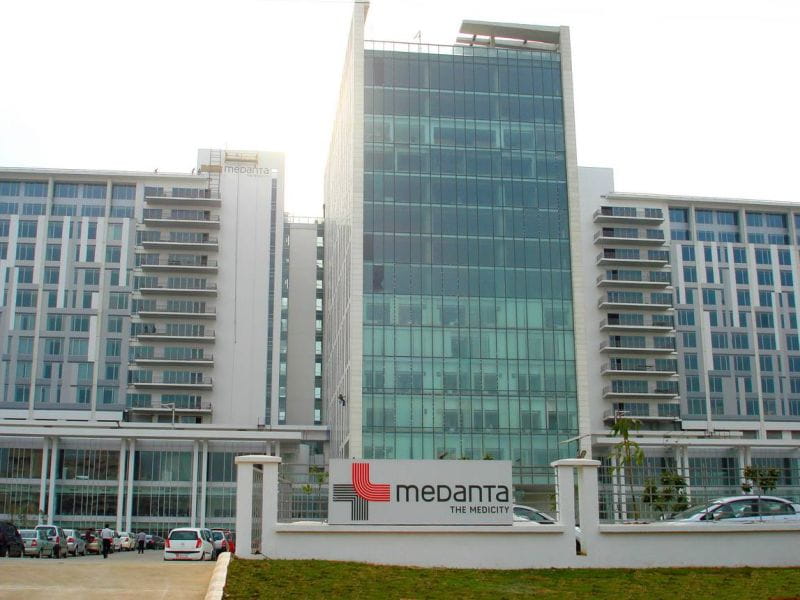
- Location: Gurgaon, Haryana
- Established: 2009
- Accreditations: NABH, NABL
Achievements and Milestones in Bone Marrow Transplant:
- Number of Transplants: Over 1,200 bone marrow transplants successfully performed.
- Pioneering Techniques: Known for performing autologous and allogeneic stem cell transplants for rare blood disorders like aplastic anemia and thalassemia.
- Other Achievements: Successfully conducted the first haploidentical (half-matched donor) transplant for acute leukemia in 2015.
Medical Team:
- Surgeons: Dr. Satya Prakash Yadav (renowned hematologist and transplant expert).
- Multidisciplinary Team: Includes specialized hematopathologists, transplant coordinators, and critical care specialists.
- Experience: The team has a combined experience of 50+ years in managing complex blood disorders.
Facilities and Technology:
- Bone Marrow Transplant Unit: State-of-the-art isolation rooms to prevent infections.
- Advanced Technology: Integration of molecular diagnostics for personalized transplant protocols.
- Imaging and Diagnostics: Equipped with advanced MRI and CT scanners for precision diagnosis.
Comprehensive Care:
- Pre-Transplant Evaluation: Includes HLA typing and psychological evaluations.
- Post-Transplant Care: Offers long-term follow-up care for graft-versus-host disease (GVHD).
- Support Services: Comprehensive family counseling and dietary planning.
4) Artemis Hospitals, Gurgaon
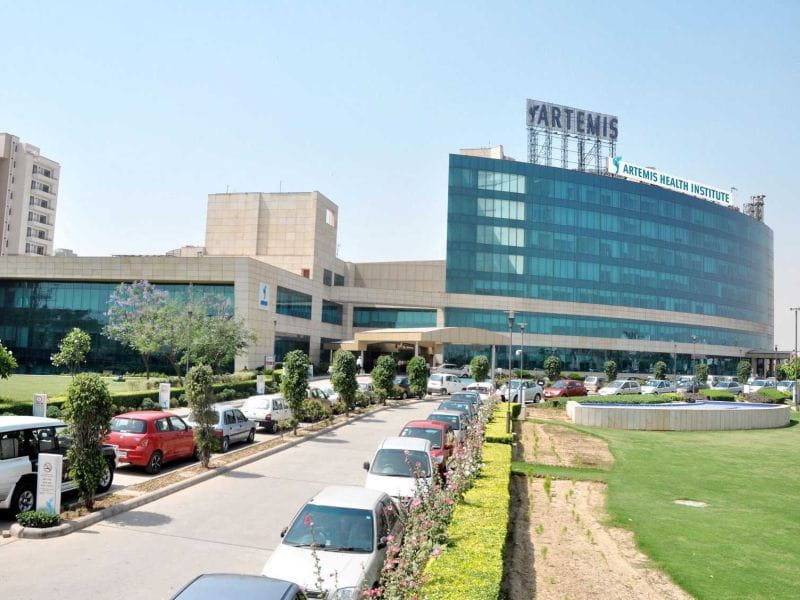
- Location: Gurgaon, Haryana
- Established: 2007
- Accreditations: NABH, JCI
Achievements and Milestones in Bone Marrow Transplant:
- Firsts: Performed the first pediatric unrelated donor stem cell transplant in North India.
- Other Achievements: Known for its work in treating rare genetic disorders like Fanconi anemia with bone marrow transplantation.
- Success Rate: Maintains a high success rate of 85–90% for transplants in early-stage leukemia patients.
Medical Team:
- Surgeons: Dr. Gaurav Kharya (expert in pediatric bone marrow transplants).
- Multidisciplinary Team: Involves hematologists, immunologists, and experienced nursing staff.
- Experience: The team has handled over 500 pediatric transplants successfully.
Facilities and Technology:
- Bone Marrow Transplant Centre: Designed with HEPA filtration for infection control.
- Advanced Technology: Incorporates next-generation sequencing for donor-recipient compatibility.
- Imaging and Diagnostics: Offers comprehensive blood and genetic testing facilities.
Comprehensive Care:
- Pre-Transplant Evaluation: Includes a detailed immunological assessment.
- Post-Transplant Care: Offers personalized rehabilitation programs.
- Support Services: Provides mental health support for patients and families.
5) Fortis Memorial Research Institute, Gurgaon
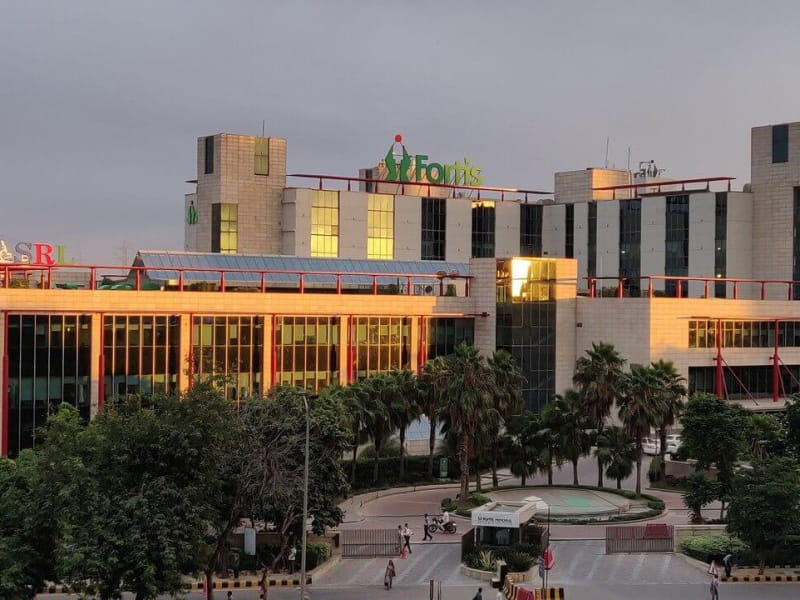
- Location: Gurgaon, Haryana
- Established: 2012
- Accreditations: NABH, JCI
Achievements and Milestones in Bone Marrow Transplant:
- Number of Transplants: Over 1,000 transplants, including unrelated donor and haploidentical transplants.
- Pioneering Techniques: First to implement immunotherapy as part of post-transplant care in North India.
- Other Achievements: Successfully performed a triple cord blood transplant for a rare lymphoma case.
Medical Team:
- Surgeons: Dr. Rahul Bhargava, a leader in hematology and transplants.
- Multidisciplinary Team: Includes experts in pediatric hematology and critical care.
- Experience: The team has international training and decades of combined experience.
Facilities and Technology:
- Bone Marrow Transplant Centre: Equipped with laminar airflow technology for sterile procedures.
- Advanced Technology: Focus on minimally invasive techniques for donor marrow extraction.
- Imaging and Diagnostics: Advanced PET-CT for accurate disease staging.
Comprehensive Care:
- Pre-Transplant Evaluation: Detailed risk stratification and donor matching services.
- Post-Transplant Care: Comprehensive follow-up for secondary infections and complications.
- Support Services: Offers patient helplines and nutritional counseling.
6) Apollo Hospital, Chennai
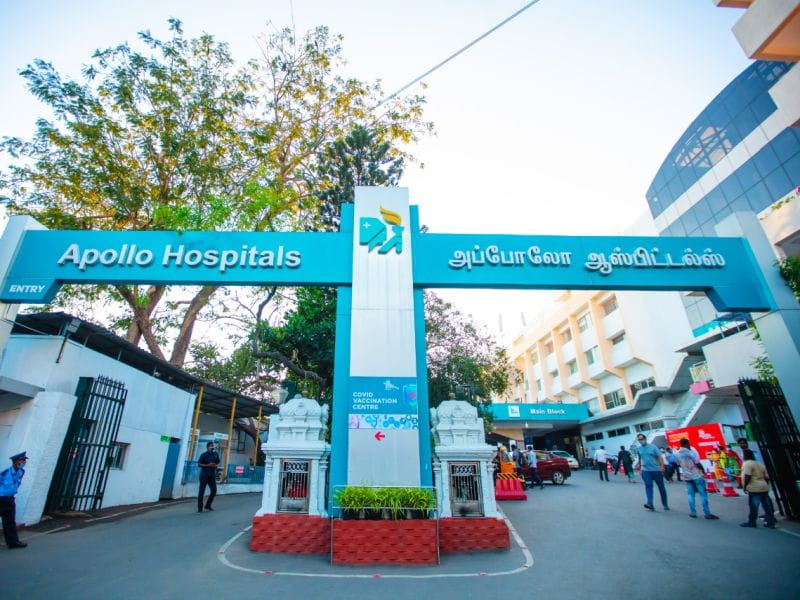
- Location: Chennai, Tamil Nadu
- Established: 1983
- Accreditations: NABH, JCI
Achievements and Milestones in Bone Marrow Transplant:
- Firsts: India’s first successful unrelated donor transplant was conducted here in 1991.
- Pioneering Techniques: Known for umbilical cord blood transplants for pediatric patients.
- Other Achievements: Recently performed a groundbreaking transplant for severe combined immunodeficiency (SCID).
Medical Team:
- Surgeons: Dr. P. Suresh (renowned for pediatric transplants).
- Multidisciplinary Team: Includes genetic counselors and hematologists.
- Experience: One of the most experienced teams with over 2,000 transplants.
Facilities and Technology:
- Bone Marrow Transplant Unit: Offers private isolation rooms with 24/7 monitoring.
- Advanced Technology: Focus on gene-editing techniques for rare genetic disorders.
- Imaging and Diagnostics: High-resolution imaging for accurate disease detection.
Comprehensive Care:
- Pre-Transplant Evaluation: In-depth assessment of immunological and psychological factors.
- Post-Transplant Care: Dedicated outpatient clinics for long-term monitoring.
- Support Services: Comprehensive counseling and financial aid programs.
7) BLK Super Speciality Hospital, Delhi
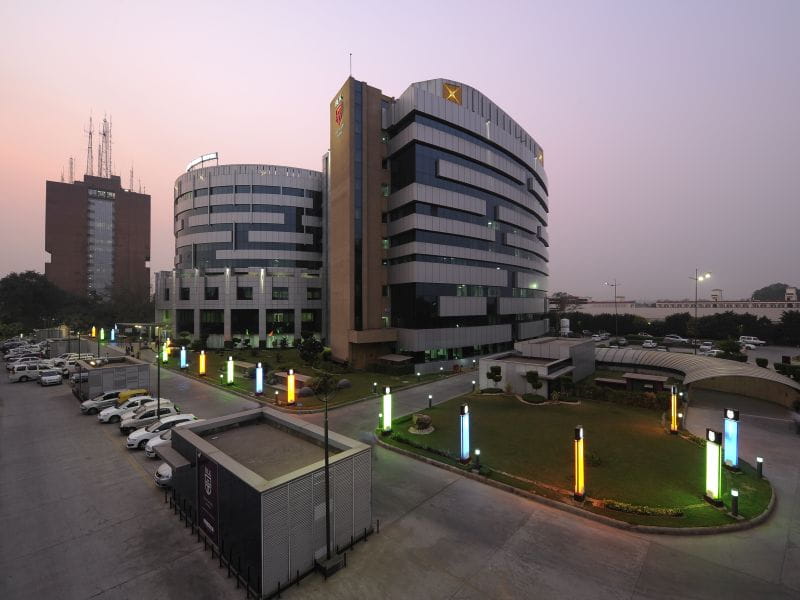
- Location: Delhi
- Established: 1959
- Accreditations: NABH, NABL
Achievements and Milestones in Bone Marrow Transplant
- Number of Transplants: Over 1,500 bone marrow transplants were successfully performed.
- Pioneering Techniques:
- North India’s first haploidentical bone marrow transplant for sickle cell anemia.
- Advanced techniques for unrelated donor stem cell transplants, particularly in thalassemia major.
- Firsts:
- First to conduct an unrelated donor transplant for an adolescent leukemia patient in India.
- First pediatric stem cell transplant for primary immunodeficiency disorders.
- Other Achievements:
- Successfully conducted a transplant on a patient with pure red cell aplasia, a rare hematological condition.
- Recognized as a center of excellence for treating blood disorders and bone marrow transplants in Southeast Asia.
Medical Team
- Surgeons:
- Dr. Dharma Choudhary, Director, and Head of Bone Marrow Transplant, with expertise in hematology and transplants.
- Multidisciplinary Team:
- Includes pediatric hematologists, infectious disease specialists, and transplant immunologists.
- Highly skilled nurses trained in managing post-transplant complications.
- Experience:
- Over 30 years of collective experience in hematopoietic stem cell transplantation.
Facilities and Technology
- Bone Marrow Transplant Centre:
- Equipped with HEPA-filtered isolation rooms to minimize infection risks.
- Separate units for autologous and allogeneic transplants.
- Advanced Technology:
- Integration of CAR-T cell therapy for specific blood cancers.
- Sophisticated molecular diagnostics for donor-recipient compatibility.
- Imaging and Diagnostics:
- State-of-the-art imaging facilities, including high-resolution MRI and PET-CT scanners.
8) Manipal Hospital, Bangalore
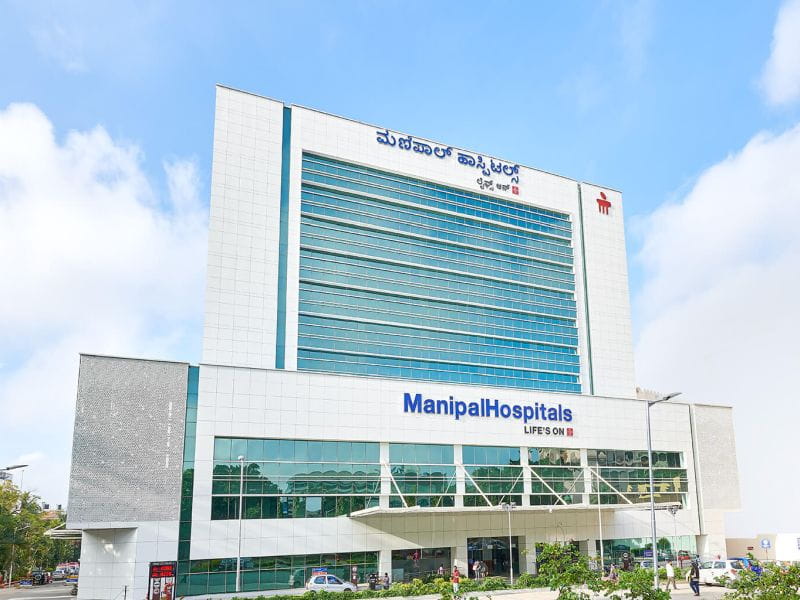
- Location: Bangalore, Karnataka
- Established: 1991
- Accreditations: NABH, JCI
Achievements and Milestones in Bone Marrow Transplant
- Number of Transplants: Over 1,200 successful transplants, including pediatric cases.
- Pioneering Techniques:
- Among the first in India to implement unrelated cord blood transplants for inherited blood disorders.
- Pioneered haploidentical (half-matched donor) transplants for patients with no fully matched donors.
- Firsts:
- Conducted the first bone marrow transplant for a rare congenital disorder, Diamond-Blackfan anemia, in South India.
- Introduced advanced immunotherapy protocols in conjunction with transplantation for relapsed cancers.
- Other Achievements:
- Recognized for performing high-risk transplants on patients over 65 years of age.
- Successfully treated international patients from over 15 countries, making it a global hub for transplants.
Medical Team
- Surgeons:
- Dr. Sachin Jadhav, Head of the Bone Marrow Transplant Unit, with international expertise in hematology.
- Multidisciplinary Team:
- Onboard pediatric oncologists, critical care specialists, and hematopathologists.
- Anesthesia experts for complex surgeries.
- Experience:
- Over three decades of cumulative experience in transplantation and associated fields.
Facilities and Technology
- Bone Marrow Transplant Centre:
- Advanced infection control with positive-pressure isolation rooms.
- Cutting-edge transplant units for both autologous and allogeneic procedures.
- Advanced Technology:
- Utilizes next-generation sequencing for genetic and molecular analysis.
- CAR-T cell therapy trials are underway for advanced blood cancers.
- Imaging and Diagnostics:
- Comprehensive diagnostic labs with advanced hematological testing.
9) Kokilaben Dhirubhai Ambani Hospital, Mumbai
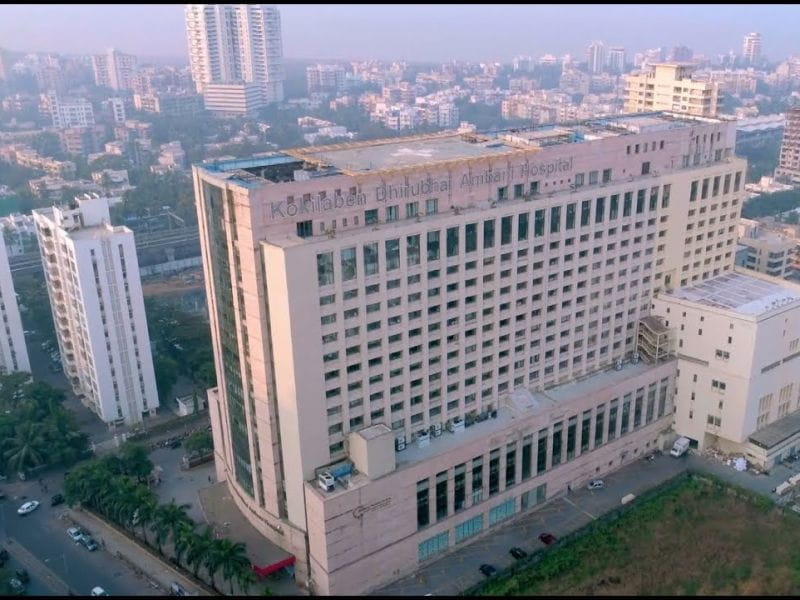
- Location: Mumbai, Maharashtra
- Established: 2009
- Accreditations: NABH, JCI
Achievements and Milestones in Bone Marrow Transplant
- Number of Transplants: Over 1,500 successful bone marrow transplants.
- Pioneering Techniques:
- One of the first hospitals in India to perform reduced-intensity conditioning transplants for elderly patients.
- Expertise in matched sibling donor transplants and unrelated donor transplants.
- Firsts:
- Performed Mumbai’s first successful haploidentical transplant for a rare case of Wiskott-Aldrich Syndrome.
- Introduced non-myeloablative (mini-transplant) procedures for specific leukemia cases.
- Other Achievements:
- Treated multiple international patients from 30+ countries for complex transplants.
- Recognized for its specialized pediatric bone marrow transplant program addressing genetic blood disorders like thalassemia and SCID.
Medical Team
- Surgeons:
- Dr. Sameer Melinkeri is a leading hematologist and transplant specialist.
- Multidisciplinary Team:
- Includes infectious disease specialists, critical care experts, and clinical psychologists.
- Experience:
- The team boasts over 20 years of collective experience in hematopoietic stem cell transplantation.
Facilities and Technology
- Bone Marrow Transplant Centre:
- Furnished with high-efficiency particulate air (HEPA) filtration systems to ensure sterility.
- Separate pediatric and adult transplant units.
- Advanced Technology:
- Uses advanced flow cytometry and molecular diagnostics for precision in donor matching.
- Ongoing trials for CAR-T cell therapy to expand treatment options.
- Imaging and Diagnostics:
- Offers real-time imaging during transplant procedures for accuracy and monitoring.
10) Narayana Health City, Bangalore
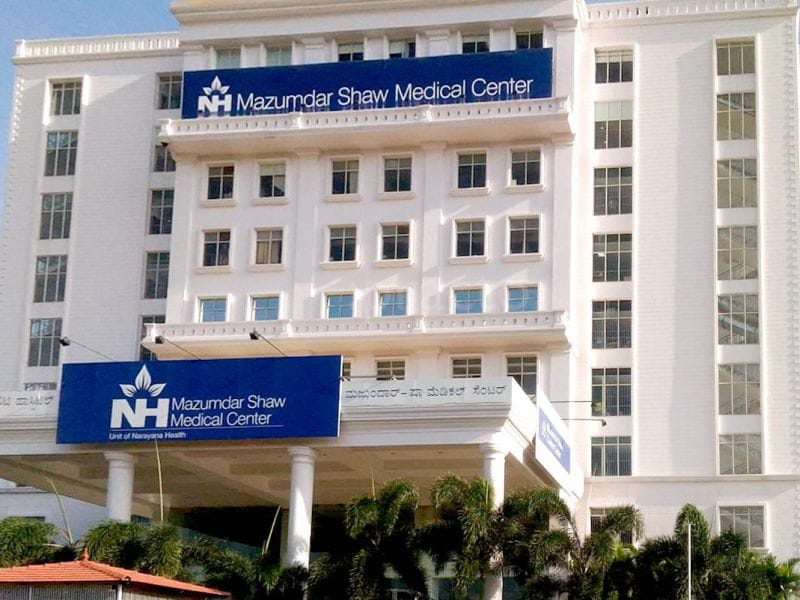
- Location: Bangalore, Karnataka
- Established: 2000
- Accreditations: NABH, JCI
Achievements and Milestones in Bone Marrow Transplant
- Number of Transplants: Over 2,000 bone marrow transplants were successfully conducted.
- Pioneering Techniques:
- Specialized in haploidentical transplants and cord blood transplants.
- Expertise in using T-cell depletion techniques to minimize transplant rejection risks.
- Firsts:
- First in India to perform a double cord blood transplant for a rare case of aplastic anemia.
- Successfully treated a rare genetic disorder, Hemophagocytic Lymphohistiocytosis (HLH), through bone marrow transplantation.
- Other Achievements:
- Recognized as a leading center for pediatric transplants, including unrelated donor transplants for congenital disorders.
- Collaboration with global organizations to adopt the latest transplant technologies.
Medical Team
- Surgeons:
- Dr. Sharat Damodar is renowned for his expertise in hematology and stem cell transplants.
- Multidisciplinary Team:
- Includes transplant nurses, immunologists, and specialized rehabilitation staff.
- Experience:
- Decades of cumulative experience with a high focus on patient safety and outcomes.
Facilities and Technology
- Bone Marrow Transplant Centre:
- Dedicated units for high-risk transplants with advanced infection control systems.
- Comprehensive donor registries to facilitate rapid matching.
- Advanced Technology:
- Integration of CRISPR gene-editing techniques in ongoing research for genetic disorders.
- Real-time monitoring systems for critical post-transplant care.
- Imaging and Diagnostics:
- Advanced imaging technology, including PET-CT and bone density scanning.
Conclusion
A bone marrow transplant is a life-saving process, but it comes with significant costs that vary depending on the type of transplant, the hospital, and the city. India offers world-class medical facilities at much lower prices compared to many other countries, making it a preferred destination for this treatment. Choosing the right hospital and planning for associated costs like pre-operative tests and post-transplant care is essential for a smooth recovery.
If the cost of a bone marrow transplant feels overwhelming, crowdfunding platforms can provide a lifeline. By sharing your story with a compassionate community, you can raise money to cover medical expenses, ensuring that financial challenges don’t stand in the way of accessing life-saving treatment.
For further details on treatment and surgery costs in India, visit our Comprehensive Guide to Treatment & Surgery Costs in India.
FAQs About Bone Marrow Transplant Costs in India
1. How much does a Bone Marrow Transplant cost in India?
The cost of a BMT in India typically ranges from ₹12,50,000 – ₹55,00,000, depending on the type of transplant, hospital location, and other factors.
2. Which is the cheapest city in India for a Bone Marrow Transplant?
Government hospitals like AIIMS in Delhi offer the procedure at a significantly lower cost, starting from ₹2,00,000, making it one of the most affordable options.
3. Are there any government schemes for Bone Marrow Transplants in India?
Yes, several state and central government health schemes, such as Ayushman Bharat and the Prime Minister’s Relief Fund, provide financial assistance for eligible patients.
4. What are the critical factors influencing the cost of a BMT in India?
Key factors include the type of transplant, donor matching expenses, hospital facilities, patient’s condition, and post-transplant care.
5. Is Bone Marrow Transplant covered under health insurance in India?
Many insurance providers cover BMT under critical illness or comprehensive health plans, but it’s essential to confirm with your insurer for specifics.
6. How long is the recovery period after a Bone Marrow Transplant?
The recovery period differs but typically ranges from 3 to 12 months, depending on the patient’s health and the type of transplant.
7. Why is India a preferred destination for Bone Marrow Transplants?
India offers world-class medical care at a fraction of the price compared to Western countries, along with highly skilled specialists and cutting-edge facilities.
8. Are there risks associated with Bone Marrow Transplants?
Yes, risks include infections, graft versus host Disease, and organ damage. However, these can be managed with proper care and monitoring.












